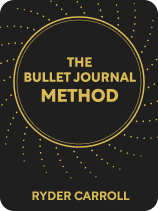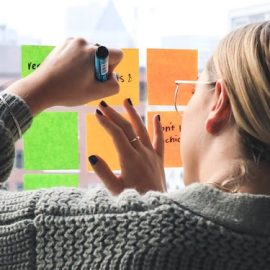

This article is an excerpt from the Shortform book guide to "The Bullet Journal Method" by Ryder Carroll. Shortform has the world's best summaries and analyses of books you should be reading.
Like this article? Sign up for a free trial here .
Why is it important to grow self-awareness? How can you use your Bullet Journal to improve your self-awareness?
In his book The Bullet Journal Method, Ryder Carroll discusses how Bullet Journaling can do more for you than just keeping track of your schedule and tasks. Carroll says that Bullet Journaling can also help you improve your self-awareness through reflection and taking notes.
Here’s how to improve self-awareness, according to Ryder Carroll.
Building Self-Awareness
In our pursuit of living the best quality life possible, we can’t forget about the world around us—after all, our lives don’t exist in a vacuum. Carroll argues that because our actions can affect others, we have a responsibility to build self-awareness, increasing the likelihood that we’ll influence others in a positive way.
(Shortform note: Despite Carroll’s argument that we have a responsibility to become more self-aware, research suggests that very few people are. In one study that assessed managers’ perceived versus actual leadership effectiveness, only 10 to 15% were accurate in their self-assessments. In other words, only a fraction was truly self-aware.)
At the same time, Carroll acknowledges that it’s easy to forget how greatly our actions impact others. Whether positive or negative, what we put out into the world has consequences that affect the quality of our lives and the lives of those around us. What’s more, research shows that negativity travels especially easily—when we’re exposed to it, we can unintentionally spread it to the people around us.
(Shortform note: The fast spread of negativity is especially evident on social media. A recent study, for instance, sought to discover whether people engage with more positive or negative news on Twitter. The results showed that although the majority of users’ personal content is positive, negative news draws more attention. Not only do news organizations tend to tweet more negative news, but people also share that news more broadly.)
The Bullet Journal Solution
Here’s how to improve self-awareness using your Bullet Journal:
1) Practicing Self-Compassion
First, Carroll says that a part of building self-awareness and positively impacting others is learning to be kind to yourself through self-compassion. In being kind to yourself, you’re more likely to be kind to others.
(Shortform note: Why are we more likely to be kind to others when we’re kind to ourselves? According to research, when we have self-compassion, we’re not only more caring and accepting people but also grant ourselves and others more freedom and autonomy.)
To practice self-compassion, Carroll suggests that you imagine you’re talking to a kind and encouraging friend as you reflect on entries in your journal. Like a friend, your journal can provide you with evidence to combat your negative thoughts and self-doubt. During your daily reviews, he recommends that you look at your daily record and gratitude entries, which can encourage you through evidence of your accomplishments and experiences.
(Shortform note: Although self-compassion can help you combat negative thoughts, it’s not meant to alleviate suffering entirely. According to researcher Kristin Neff, the goal of self-compassion is to embrace yourself with the support and comfort needed to bear your pain. What’s more, for some people, pain actually increases when they begin practicing self-compassion, because opening yourself up to love also makes you more vulnerable to your trauma.)
2) Taking Notes on Interactions
Carroll says you can also use your journal to get a clearer picture of your relationships. He explains that you should be aware of who you spend your time with, as not only do you influence them, but they also influence you. One way to do this is to take notes on your interactions with people in your daily record, noting both who inspires you and who drains your energy.
(Shortform note: Once you take notes on your interactions with others, what should you do with that information? To evaluate the quality of your relationships as you reflect on them, ask yourself questions such as “Do they invest as much time and energy as I do?”, “Is it easy or difficult to connect with them?”, and “Do we listen to and encourage each other?”)
3) Reflecting on Learning
Finally, Carroll argues that continual learning is one of the best ways to encourage self-awareness, personal growth, and positive impact. By making learning an important part of your life, you can grow in ways that positively influence the people around you.
(Shortform note: According to experts, the relationship that Carroll observes between learning and self-awareness works the other way around, too. Specifically, lifelong learning and personal development depend heavily on our awareness of who we are. Without self-awareness, we’re at greater risk of feedback-avoiding behavior that negatively impacts the way we gather, perceive, and learn from information.)
Carroll says you can better integrate learning into your life by making it a part of your daily review. As you reflect on your day, ask yourself questions that help you determine what you’re currently learning and what you want to know more about. Additionally, he recommends that you create a customized section in your journal where you can list the things you want to learn and brainstorm actions you can take toward learning them. Once you’ve determined which steps to take, turn them into tasks to add to your daily record, monthly task list, future planner, or another customized section.
(Shortform note: While Carroll’s strategy of setting learning goals has the benefit of being direct, there are more subtle changes and additions you can make in your day-to-day life to encourage learning. Some examples include reading often about a variety of topics, surrounding yourself with intelligent and talented people, taking time to teach or mentor others, and joining discussion groups that expose you to new ideas and perspectives.)

———End of Preview———
Like what you just read? Read the rest of the world's best book summary and analysis of Ryder Carroll's "The Bullet Journal Method" at Shortform .
Here's what you'll find in our full The Bullet Journal Method summary :
- A comprehensive guide to using the Bullet Journal Method
- How to maintain a journaling practice that can improve your overall quality of life
- How to extend the method beyond productivity to a practice in mindfulness






